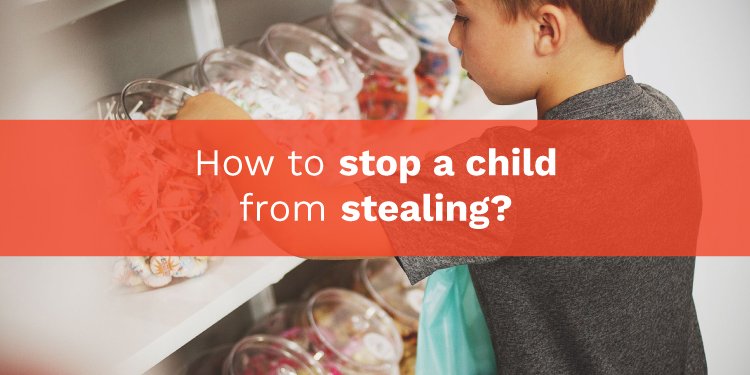Parents get concerned when their child or adolescent steals. They get concerned about the circumstances that led their child to theft. So how can you stop your child from stealing?
It is natural for young children to take anything that piques their curiosity. It should not be considered theft until the child is old enough to understand that taking something that belongs to another person is wrong.
Parents should teach property rights and consideration to the youngsters. Parental figures serve as role models for their children. Your lessons on honesty will be much more difficult for your youngster to understand. So you should never bring home office stationery or pencils or boast about a mistake at the supermarket checkout counter.
Many young children, particularly those without older siblings, are as hazy about property rights as they are about truth. There will be many objects that belong to everyone in the family. Some borrowed items belong to a specific person, and a few are “private goods” for the owner’s use only.
There’s no point in making a major problem out of a minor one. It’s normal for youngsters to accumulate items that pique their interest. It would be best if you were not too hard on them until they are old enough to comprehend everything.
Even so, you can’t afford to take it lightly. Even if they’re three or four years old, other people may accuse them of stealing and make a big deal out of it.
Instead of getting enraged and offended and making them feel humiliated, you should try to provide what they need. If the stealing continues, it’s usually best to seek professional help before your child reaches school age. It is easier for a child to receive a label like “thief” than to get rid of it.
Table of Contents
Keep an eye out for the following theft red flags:
- Self-esteem issues.
- Impulsiveness is also characterized by a strong desire with a lack of control.
- In general, insensitive to the feelings of others.
- There is no social connection.
- Anger.
- Change in the family situation.
- They get bored.
Kleptomania (A mental health disorder)
Kleptomania is the inability to resist the cravings to steal stuff you don’t need and of little worth. It is a rare but dangerous mental health illness. If it’s left untreated, it can cause a lot of emotional agony for you and your loved ones.
Kleptomania is an example of an impulse control disorder. It is also defined as a lack of emotional or behavioral self-control. If you have this condition, you will have trouble resisting the urge to do something excessive or harmful.
Because they get scared to seek mental health therapy, many persons with kleptomania endure lives of hidden shame. However, kleptomania has no cure or medicines. Talks therapy (psychotherapy) can help break obsessive stealing.
Seek medical help if you can’t stop shoplifting or stealing. Many persons who may have kleptomania become terrified of getting caught if they seek help.
What Makes Children Steal?
We can say, “Children are thieves.” Little kids steal a lot because of their lack of impulse control. It’s a period when; “they want it, so they get it.” Even older children are prone to stealing.
All the exciting and unique things are the same for small youngsters, “Treasure.” They understand the value of money because they hear you discussing it and see you trading it for good things. But, children see money as akin to the tokens used in slot machines; they have no notion of actual money.
Even though some children know that stealing is immoral, older children and teenagers steal for various reasons. If their sibling appears to gain favor, attention, or presents, a kid may steal to make things equal.
A youngster may steal as a show of bravery to peers or get acceptance from peers. Children may steal because they do not want to rely on others, so they take what they believe they need.
Young Children of four years may not grasp the need to avoid taking things that do not belong to them. But by the time you’re five or six years old, you’ve figured out what’s right and what’s wrong.
Even so, some children lack self-control. They may come across something they like and take it. Children don’t think about what might happen. They may not consider purchasing the item or requesting it.
Children steal for a variety of reasons:
- As they have poor impulse control.
- They wanted to look stylish and impress their pals.
- They want or need the one-of-a-kind item they like that some have.
- To retaliate against someone (for example, stealing a bully’s lunch money).
- They don’t have enough money when they want or need anything and can’t afford it either.
- When they are too embarrassed to ask you for money for some particular item (condoms, a bra)
- When they are not able to buy something lawfully (beer, cigarettes, age-restricted items).
- Children enjoy taking risks; stealing presents a high-risk, high-reward pastime.
Some children steal because they lack something in their life. It’s possible that what’s missing is love or attention. Simple basics like food and clothing come to mind. They could become enraged, depressed, afraid, or jealous. They may resort to thievery to cope with the circumstance. Stealing will not make up for what is lacking.
Other children may be dealing with personal issues that lead them to steal. They may be envious of others’ possessions. Children may feel abandoned and unloved. They may also get distressed because their parents are fighting or divorcing. Stealing will not fix these issues.
Here are some other reasons why children steal:
Lack of understanding and knowledge
Preschoolers are notorious for stealing other people’s possessions. They don’t grasp how stealing impacts others or how it might be damaging at this age.
They may also grab anything from a business because they lack economic understanding.
It’s a fantastic time to start teaching your child empathy and why stealing is wrong. It will help them learn to respect others’ property. Discuss the necessity of letting other people’s belongings alone.
Impulse Control Issues
Impulse control is a problem for many elementary and middle school students. They may stuff an item into their pockets without thinking about the ramifications. To prevent theft, teach your youngster impulse control.
As children grow older, they become more self-controllable. But some children may need further help in developing self-control.
Peer Pressure and Influence
Some children steal because their peers or relatives do it. They may assume that stealing will make them more like their buddies. Peer pressure can result in doing something like stealing, although all children do not succumb to it.
Students in junior high and high school may steal because it is “cool.” Their peers may persuade them to take items from the store or money from an unguarded locker room bag.
Teens also steal because they want to have good things that they can’t afford otherwise. Some teenagers steal to express their dissatisfaction with authorities. If stealing isn’t addressed at this age, they’re likely to face legal troubles.
Item Belonging to a Prominent Figure
Children tend to take things that belong to persons with whom they have a strong bond. These personal effects could be a symbol of their attachment to that person.
A youngster may also steal something to make it appear as if given to them. The child appreciates that item and needs to fulfill their desires.
Feel confident in your abilities
Before being successful at stealing items, children may continue to do so since they excel at and are proud of.
Other children don’t get concerned about rules. They steal because they believe it will be easy to get away with it. They may assume they are the ones entitled to the stolen items. But, children must learn to respect norms and the rights of others.
Learned Habits
Parents or other adults may have taught children to steal either directly or by example. Children may continue to steal because they believe it pleases those for whom they are stealing. They may also steal because they cannot meet their own needs in any other way.
Mental Well-Being
Stealing can get exacerbated by underlying behavior disorders or mental health issues. A child who is struggling to cope with his parents’ divorce may start acting out. When a child gets depressed, they may resort to stealing as a coping mechanism.
Children who steal frequently have parents who are “disengaged.” Parents don’t notice or respond to the child’s negative behaviors or support their positive social behaviors. This carefree act of parents will affect the child mentally.
Stealing Turns into a Habit
Repeat thieves are prone to acting in a variety of negative ways. They may deceive, fight, cheat, or spray-paint. They may disobey rules and show disdain for others and their property. Some children who steal once may steal again and again until it becomes a habit.
Even though stealing has become ingrained in their behavior, children who steal can change their ways. Children make mistakes from time to time, but there are ways to get back on track. Adults can assist children if they so desire. https://poppromos.com
Parents, counselors, and other adults can assist children in dealing with issues that may have led to them stealing in the first place. Kids can learn the difference between right and wrong. Help them improve their self-control and learn to manage difficulties without stealing.
When children are truthful and do what they believe is right, they are happy and feel much better. It might be a huge relief to learn how to get what they need without stealing.
What To Do When Your Child Has Stolen?
When your child gets found out stealing, try to keep your emotions out of the situation. The fact that your child steals is not an indictment of your parenting abilities. Take solace in the knowledge that most kids who steal do so on a sporadic basis as a crime of convenience. And the majority of them do it poorly, which is why they are always caught.
You can pay the damages and have your child work off her debt if she needs to pay off damages and she doesn’t have any money. Now is the time to be fair! Consider keeping the punishment proportional to the mistake rather than the monetary value of the damages. The key goal is to teach her not to do it in the future.
If your child gets caught stealing, you can take the following steps:
- Make use of disapproval. Make it plain right away that you will not tolerate this conduct. Tell the child that stealing is not acceptable.
- Talk about ethics and values. Don’t question them if you don’t want to end the conversation and learn nothing. It should be a quick reminder, not a lecture.
- Prevent lecturing, forecasting future bad behavior, or declaring that the child is now a thief or a nasty person. Don’t criticize, shame, scare, or ridicule your youngster.
- Make it clear that it is unacceptable in the family and community’s traditions.
- Have a conversation with your youngster. Determine why she’s stealing, what motivates her, if this is a common occurrence, and if she’s done it before.
- Allow the kid to make reparations and assist them if necessary. It means they must either return the item or pay for the damages.
- Tell your child that you’re keeping an eye on her, that she’s lost some trust, and that she’ll have to earn it back.
Some children act like a magpie, gathering money they never use. They collect other people’s stuff they don’t even own. These children may be experiencing emotional difficulties. They likely lack love or approval.
Examine the scenario. Be truthful to yourself. Is there any recurring pattern? Seek professional help if your child often steals or when other misbehaviors go with stealing.
What Can You Do If Your Child Steals?
It’s terrifying to learn that your child has stolen something. If your child is stealing, you’ll need to figure out why they are doing it. It’ll be easy to devise a strategy for dealing with the situation.
A single event does not imply that your youngster will get doomed to a life of crime. You can avoid stealing from becoming a habit if you respond healthily. Intervene right away if your child takes something. Use disciplining techniques to teach your child that stealing is wrong and to prevent them from taking items that aren’t theirs.
Recognize the Reasons Why Children Steal
Parents should investigate whether their youngsters stole because they were starving for attention. The child may be expressing displeasure or attempting to gain attention from parents in these situations.
The stolen object may serve as a substitute for love or affection. When parents take the necessary precautions, theft by children usually stops as they grow older.
Do Not Lead Them into Temptation
Children will steal money from family members as if it were common property. You should keep money in a lockable box and a secure location. Except for tiny sums in your handbag or wallet, you should keep your money inaccessible.
Sure, family members trust one another, but don’t let temptation get in the way. So, you should never leave money lying around the house.
Emphasized Honesty
Talking about honesty more often can help you avoid lying and stealing.
When your child tells the truth, please give them a less severe punishment and plenty. It would help if you also praised them when they are honest about wrongdoings.
Instill Idea of Property Ownership
Making young children responsible for their stuff might help them comprehend ownership.
Discuss the necessity of handling toys with care, for example. Make norms about respect so that everyone asks before borrowing something. Discuss the significance of caring for borrowed objects and returning them to their rightful owner.
Return Any Items That The Child Stole
If you catch your child with stolen property, demand that they return it as soon as possible. You should also make them apologize to the victim. You can assist your youngster in writing an apologetic letter or go with them to return the taken items.
Provide Consequences
Suppose a child steals their siblings’ favorite toys without permission. They may face the consequence of lending their toys to their siblings.
Take away their privilege as a logical result. An older child may need to perform more duties to earn money to repay someone for stolen things.
Making Ground Rules
Separating the question of principle from the complexity of daily practice may be beneficial. Discuss first and establish some ground rules for the second, such as:
- Don’t take something from someone else’s house without permission.
- Always ask a grown-up if you can keep anything you find.
- Don’t pick anything up in a store until a grown-up says it’s OK.
When Should You Seek Professional Help?
For a child, stealing can result in various social and emotional consequences. It may include expulsion from daycare or school. It might as well be criminal charges for teenagers.
It’s critical to go a step further if your discipline techniques aren’t working to stop them from stealing. If stealing has become a regular occurrence, you may need to seek professional help.
A skilled counselor can identify the fundamental causes of theft. Mental health issues, behavioral issues, or conduct disorders can all be the source of a problem.
A mental health expert can help you and your child develop methods to prevent theft.
Conclusion
Theft is a widespread occurrence. It would be best to treat it the same way you would any other blunder your youngster makes. It’s something that needs fixing, but it’s not much more than a child’s mental health. You can act swiftly and solve this problem if you manage it properly.
Suppose you’re having trouble discouraging your child from playing with unknown children—especially children who appear to be a harmful influence. Would you mind encouraging them to participate in a sport or activity? Getting children involved in a variety of activities will keep them active and interested. As a result, they won’t have time for other unnecessary stuff.
Frequently Asked Questions
What should we do to prevent a child from stealing?
You can avoid stealing from becoming a habit if you respond healthily. Intervene right away if your child takes something. Use disciplining techniques to teach your child that stealing is wrong. Disciplining prevents them from taking items that aren’t theirs again.
Is it possible to become addicted to stealing?
When someone with a thieving addiction shoplifts or steals, they get a rush or a high. They will have actual cravings or drives to steal if they strive to avoid stealing. This addiction, like drug addiction, takes over the mind and becomes all-consuming.















